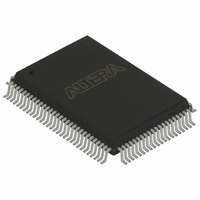EPC8QI100 Altera, EPC8QI100 Datasheet - Page 18

EPC8QI100
Manufacturer Part Number
EPC8QI100
Description
IC CONFIG DEVICE 8MBIT 100-PQFP
Manufacturer
Altera
Series
EPCr
Datasheet
1.EPC8QC100.pdf
(34 pages)
Specifications of EPC8QI100
Programmable Type
In System Programmable
Memory Size
8Mb
Voltage - Supply
3 V ~ 3.6 V
Operating Temperature
-40°C ~ 85°C
Package / Case
100-MQFP, 100-PQFP
Lead Free Status / RoHS Status
Contains lead / RoHS non-compliant
Other names
544-1239
Available stocks
Company
Part Number
Manufacturer
Quantity
Price
Company:
Part Number:
EPC8QI100
Manufacturer:
ALTERA
Quantity:
10
Company:
Part Number:
EPC8QI100
Manufacturer:
ALTERA
Quantity:
710
Part Number:
EPC8QI100
Manufacturer:
ALTERA
Quantity:
20 000
Company:
Part Number:
EPC8QI100N
Manufacturer:
ALTERA
Quantity:
1 500
Company:
Part Number:
EPC8QI100N
Manufacturer:
ALTERA21
Quantity:
444
1–18
Real-Time Decompression
Configuration Handbook (Complete Two-Volume Set)
1
Enhanced configuration devices support on-chip real time decompression of
configuration data. FPGA configuration data is compressed by the Quartus II
software and stored in the enhanced configuration device. During configuration, the
decompression engine inside the enhanced configuration device will decompress or
expand configuration data. This feature increases the effective-configuration density
of the enhanced configuration device up to 7, 15, or 30 Mbits in the EPC4, EPC8, and
EPC16, respectively.
The enhanced configuration device also supports a parallel 8-bit data bus to the FPGA
to reduce configuration time. However, in some cases, the FPGA data-transfer time is
limited by the flash-read bandwidth. For example, when configuring an APEX II
device in FPP (byte-wide data per cycle) mode at a configuration speed of 66 MHz,
the FPGA write bandwidth is equal to 8 bits × 66 MHz = 528 Mbps. The flash read
interface, however, is limited to approximately 10 MHz (since the flash access time is
~90 ns). This translates to a flash-read bandwidth of
16 bits × 10 MHz = 160 Mbps. Hence, the configuration time is limited by the
flash-read time.
When configuration data is compressed, the amount of data that needs to be read out
of the flash is reduced by about 50%. If 16 bits of compressed data yields 30 bits of
uncompressed data, the flash-read bandwidth increases to 30 bits × 10 MHz =
300 Mbps, reducing overall configuration time.
You can enable the controller's decompression feature in the Quartus II software,
Configuration Device Options window by turning on Compression Mode.
The decompression feature supported in the enhanced configuration devices is
different from the decompression feature supported by the Stratix II FPGAs and the
Cyclone series. When configuring Stratix II FPGAs or the Cyclone series using
enhanced configuration devices, Altera recommends enabling decompression in
Stratix II FPGAS or the Cyclone series only for faster configuration.
The compression algorithm used in Altera devices is optimized for FPGA
configuration bitstreams. Since FPGAs have several layers of routing structures (for
high performance and easy routability), large amounts of resources go unused. These
unused routing and logic resources as well as un-initialized memory structures result
in a large number of configuration RAM bits in the disabled state. Altera's proprietary
compression algorithm takes advantage of such bitstream qualities.
The general guideline for effectiveness of compression is the higher the device
logic/routing utilization, the lower the compression ratio (where the compression
ratio is defined as the original bitstream size divided by the compressed bitstream
size).
For Stratix designs, based on a suite of designs with varying amounts of logic
utilization, the minimum compression ratio was observed to be 1.9 or a ~47% size
reduction for these designs.
Stratix designs. These numbers serve as a guideline (not a specification) to help you
allocate sufficient configuration memory to store compressed bitstreams.
Chapter 1: Enhanced Configuration Devices (EPC4, EPC8, and EPC16) Data Sheet
Table 1–6
lists sample compression ratios from a suite of
© December 2009 Altera Corporation
Functional Description
















